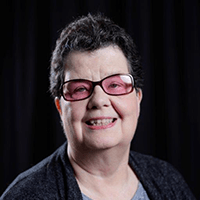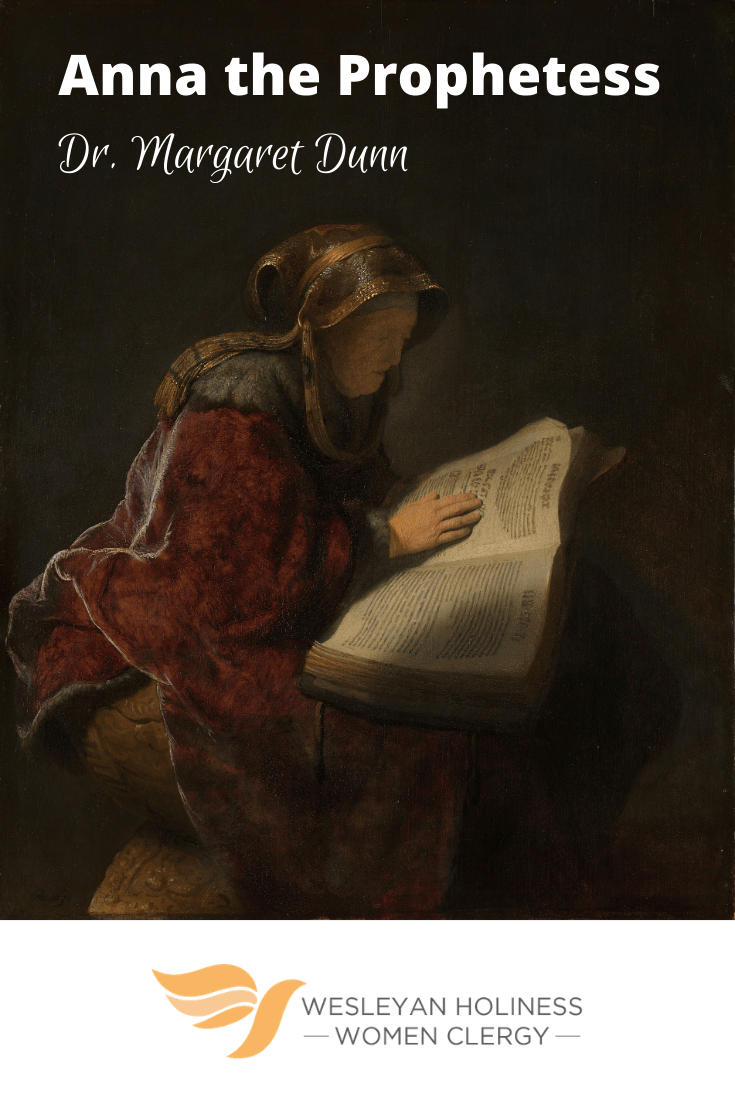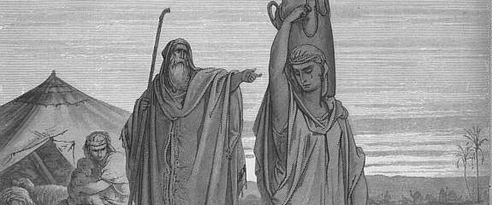Dr. Margaret Dunn is an ordained minister in the Church of God. She is serving at Mid America Christian University as an adjunct instructor and at Parkgate Community Church as a learning hour teacher for 3rd-5th grade students, a prayer partner, and a member of the missions team. She has been a member of leadership teams for the Church of God on the state and national level and was a member of the planning team for the 3rd, 4th, and 5th WHWC conferences. She lives in Pasadena, Texas.
Anna the Prophetess
Rev. Dr. Margaret Dunn • February 5, 2021 | WHWC
Luke 2:36-38: "And there was a prophetess, Anna, the daughter of Phanuel, of the tribe of Asher. She was advanced in years, having lived with her husband seven years from when she was a virgin, and then as a widow until she was eighty-four. She did not depart from the temple, worshiping with fasting and prayer night and day. And coming up at that very hour she began to give thanks to God and to speak of him to all who were waiting for the redemption of Jerusalem.” ESV
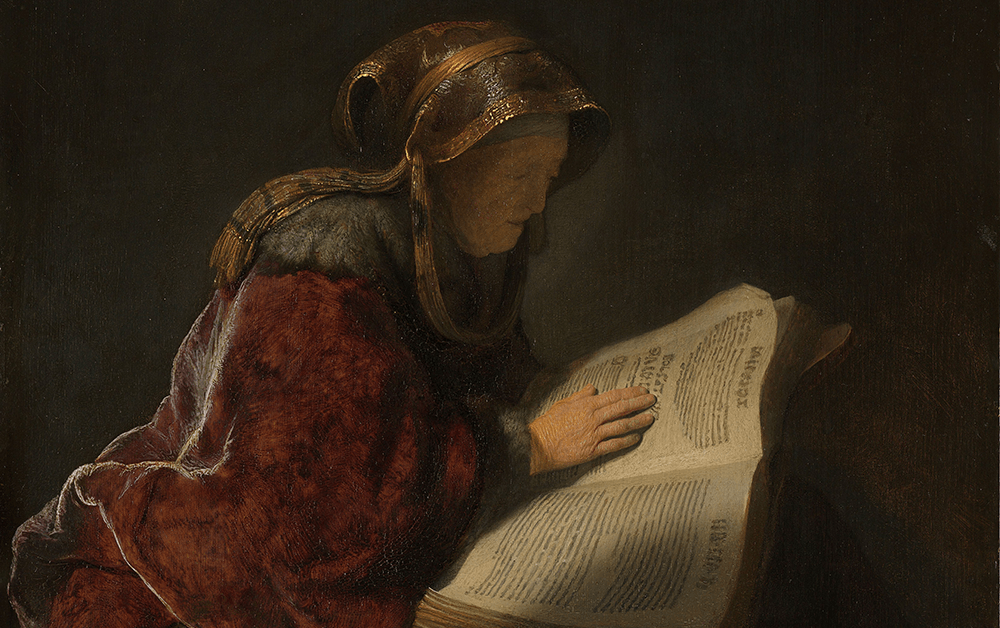
What can we learn about walking with God from the life of Anna, the Prophetess?
She is only mentioned in the Gospel of Luke as Jesus is brought to the Temple in Jerusalem to be presented to the Lord. She is the second person that Mary, Joseph, and Jesus encountered at the Temple. (The first is Simeon in Luke 1: 25-35.)
What do we know about Anna? Luke tells us she was a prophetess; she was a daughter of Phanuel; she was married for only seven years; she is now at least 84 years old; and she lived at the Temple where she worshiped with fasting and prayer night and day. Luke records that she was a daughter of Phanuel which means “face of God” and of the tribe of Asher. “She numbers among the few New Testament characters with tribal listings. Others include Jesus, of the house and lineage of David and the tribe of Judah (Luke 2:4; Matthew 1:1-16), Saul of Benjamin (Philippians 3:5) and Barnabas, a Levite (Acts 4:36).” (Branch, 2020) We also know that Anna and Hannah come from the same root word, and the meaning of Anna is favor or grace (Bible Gateway 1988).
These verses may exhaust our knowledge of Anna, but even this brief description tells us what is most important about her. “Unlike Simeon, who knew he would find the messiah, Anna simply recognized the Lord. After decades and decades in the Temple, seeing people coming and going with their sacrifices every day, she had the vision to recognize that one young couple and their child were unlike any of the others” (Daily Gospel Reflection).
“What gave her that ability to see—to recognize the divine in the midst of the ordinary? All we know is that she fasted and prayed—she cultivated a close relationship with God. She knew God—she was familiar with God because she spoke with God every day. And that familiarity opened her eyes to recognizing God’s presence in situations outside of prayer. The same is true for us—a habit of prayer opens our eyes to recognize God’s presence in the rest of our life experience” (Daily Gospel Reflection).
Anna did not have to be told the child was Jesus, or God’s son. She immediately began giving thanks for Him and spoke of Jesus to all who were looking for the redemption of Israel. Her life of worship with prayer and fasting gave her a close relationship with God so that when He came into her presence as a child, she knew Him. As one author said “The same is true for us—a habit of prayer opens our eyes to recognize God’s presence in the rest of our life experience” (Daily Gospel Reflection).
What can we learn from Anna?
The first thing is that we are never too old to worship God, to pray, and to have his presence as a part of our lives. Anna’s service to God was worship, prayer, and fasting. Are these foundational in our service to God or do we get too busy to spend time with God. Anna recognized God’s son because she knew God intimately. She recognized the Son of God because she knew the Father God. How are we cultivating our relationship with the Father so that we recognize His presence in our lives? Are we able to discern His voice above and amidst all the other voices that surround us each day?
Anna knew that God had provided for her and would continue to provide for her basic needs. She was a widow and had no home that is mentioned. She lived in the Temple and had to rely on others to provide food when she was not fasting and clothing. Do we believe that? Do we trust God to provide for us as we live out the ministry to which He has called us?
Anna thanked the Lord. Anna’s prayers were paired with praises. Luke records in verse 38 that she gave God thanks when she saw the child. When we see God in our midst, do we stop and give thanks to God or do we run to tell someone else what happened?
Anna did this, also, but only after she had thanked God.
We are called to share the Good News, let us not forget to give God thanks.
References:
Bible Gateway. 1998 “All the Women of the Bible: Anna”. Zondervan. Retrieved from https://www.biblegateway.com/resources/all-women-bible/Anna, December 2, 2020.
Branch, Robin Gallaher 2020 “Anna in the Bible” in Bible History Daily. Retrieved from https://www.biblicalarchaeology.org/daily/people-cultures-in-the-bible/people-in-the-bible/anna-in-the-bible/, December 2, 2020.
St. Anna the Prophetess 2020 Daily Gospel Reflection University of Notre Dame Retrieved from http://faith.nd.edu/s/1210/faith/interior.aspx?sid=1210&gid=609&calcid=25793&calpgid=61&pgid=26183&crid=0, December 2, 2020
Swiatocho, Kris 2006 “The Women in Christ's Life: Anna, The Prophetess” Crosswalk.com. Retrieved from https://www.crosswalk.com/family/singles/the-women-in-christs-life-anna-the-prophetess-1373811.html, December 2, 2020.
Enjoyed this article? Connect with us on one of our social media platforms. Share it and forward it to a friend:

Wesleyan Holiness has a rich and diverse history of women empowered by the Holy Spirit following God in obedience to Him, blocking out the voices of those who didn't embrace or encourage women preachers. Each one of them are the women whose shoulders we stand upon, making way for the next generation of women pastors coming up behind us.
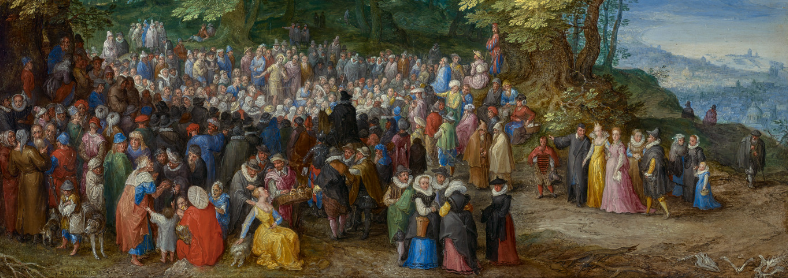
The wonderfully freeing truth we have in the Beatitudes is that they are not a checklist of to-dos and rules to hem us in, keep us in line, or that we must check off. The Beatitudes are words given to us as grace, dripping like honey from a honeycomb with blessing and hope in a desperate and broken world.

